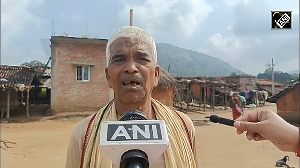"I think we'd all be happy if India and Pakistan gave up their nuclear weapons and joined the Non-Proliferation Treaty. But It's not going to happen," Assistant Secretary of State for South and Central Asian Affairs Richard Boucher said on Wednesday.
"We went into this negotiation knowing the positions that India had taken all along. This is a real-world agreement. We don't claim it's perfect," he told lawmakers on the Asia-Pacific committee of the House International Relations Panel.
Debunking the notion that the US had given away "too much" in the agreement, Boucher claimed the deal provided "a net gain for non-proliferation" as India has already taken steps to bring itself in "alignment with the international non-proliferation regime."
"They've improved their export control systems, brought their standards into alignment with the practices of the Nuclear Suppliers Group already. They have pledged to support negotiations on a fissile material cutoff treaty. They have begun their discussions with the International Atomic Energy Agency," he said in response to a question.
According to Boucher, civil nuclear cooperation with India would "elevate the US-India relationship to heights we have never previously achieved."
"It will secure their increasing conviction that there is solid support from the US government for long-term civil nuclear cooperation and thereby open the door to cooperation across the board," he added.
Noting that the "significance of the initiative should not be underestimated", the senior State Department Official said that implementing it was a "top priority" for both countries.
The nuclear deal has "substantial benefits in terms of India's development" and would help provide clean energy for its economic development, Boucher said.
"We would like to have them get some of that energy in the form of nuclear power, particularly if they buy it from American firms, rather than having to go out into the international petroleum markets and oil and gas markets and try to buy all their energy, which just puts greater stress on energy prices worldwide," he said.
"At a time when some countries are tearing up their agreements and breaking their seals and kicking out the inspectors, we do think it's important that a major nation would bring itself closer and pledge to put two-thirds of their reactors under safeguards and increase that percentage over time," Boucher said.
"I think we've got a substantial gain on non-proliferation and substantial benefits elsewhere. So that's what we got in return for allowing this kind of cooperation," he said.
Boucher noted that the nuclear deal is one of the most important aspects of the US' strategic partnership with India.
"As Secretary Rice said during her hearing before the full committee early in April, this initiative is an historic strategic achievement that will advance energy security, further environmental protection, foster economic and technological development in both our countries, bolster international security, and strengthen the global non-proliferation regime," he said.
"Simply put: if we can do nuclear power, we can do anything together. The advantages of such a relationship for regional stability and for the future of over a billion people are many," Boucher said.
"India has pledged, for the first time, to submit its entire civil nuclear programme to international inspection and to take on significant new non-proliferation commitments in exchange for full civil nuclear cooperation with the international community," he added.
Boucher pointed out that with this initiative, the world expects India to be a full partner in non-proliferation while India expects the world to help meet its growing energy needs.
"We will continue to work with India on a range of non- proliferation issues as it implements its Joint Statement commitments and our strategic partnership further unfolds," he said.
The State Department official also stressed the economic benefits of the civilian nuclear agreement.
"The Indians plan on building 15 or so reactors over the next 20 years. If we just got one or two of them, that could be tens of thousands of jobs in the United States. We certainly have very capable companies. We have new technologies. We have an ability to compete with the best of them, but there is an international market in nuclear power plants, nuclear technology," he said.
"There will be competition and we will do everything we can to support Americans in that competition. Ultimately, the choices will be for India to make, but once we have the basis for US cooperation, the basis for international cooperation, people can compete on the basis of a fair market - commercial decisions, technology decisions - and not trying to get around the rules somehow," he said. When asked what would happen if the civilian nuclear energy deal were to go down the "tubes" in the US, Boucher told lawmakers India would still have access to the world's technology.
"India will have access to a variety of suppliers, both of fuel and of power plants. I think we are as competitive as anyone in terms of some of the American companies that make this technology. I don't have any doubt the French will be in the competition, the Russians will be in the competition and others will be there with their technologies.
"But I'm fairly confident in the capabilities of US companies. Certainly, they'll have all the support they deserve from the US government," he said.
Appealing to the Congress to give its "crucial" support to "grasp this important opportunity", Boucher pointed out that US officials were engaging with their Indian counterparts on a daily basis.





